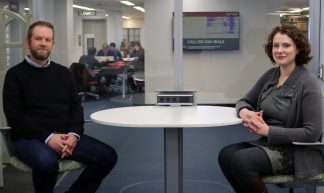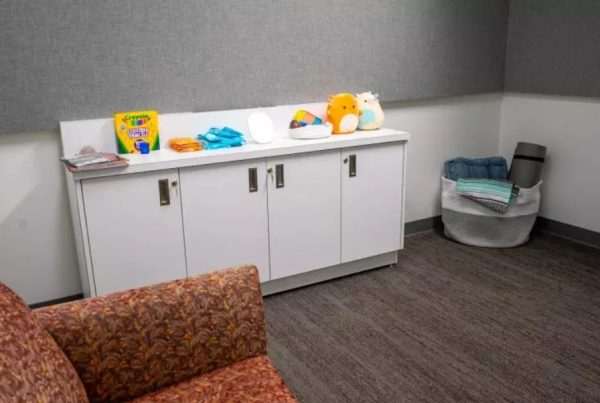By Amy Claussen

Franklin Sayre and Caitlin Bakker
Research labs at the University of Minnesota work with a lot of big data, and management of that content is no small task.
Librarians at the University of Minnesota Bio-Medical Library have been working closely with science-based researchers to teach data management best practices that can be introduced into the research lab workflow. This includes the recent work of Caitlin Bakker, Research Services Librarian, and Franklin Sayre, Pharmacy Librarian, to develop and teach data management education courses for active research labs that address needs related to managing increasingly complex datasets.
Bakker and Sayre’s course for active research labs offers flexible sessions that include relevant hands-on learning activities that are customized to needs of the individual research labs.
Bakker provides details of the course and her collaboration with Sayre in her chapter “Data Management in the Lab” in the recently published The Medical Library Association Guide to Data Management for Librarians.
Making connections and adding value
Bakker’s chapter emphasizes the importance of connecting with research faculty. It is through discussions with researchers that Bakker and Sayre were able to assess areas of concern in data management and craft the sessions to meet the unique needs of the research labs.
Course participants included post-doctoral associates, junior scientists, and graduate and undergraduate students. Bakker emphasizes that all participants bring valuable perspectives to the conversation.
Bakker’s chapter also highlights the valuable role of libraries. “The libraries’ value-added services are highlighted in the course by demonstrating best practices of data management that may have not occurred to experts in the lab,” she says.
The adult learning theory of Andragogy provided guidance for Bakker and Sayre as they developed an approach to teaching data management that is relevant in a lab setting. Bakker also says that she and Sayre intentionally focused the course content to reflect the everyday work of the participants, meaning that the information was immediately practical.
Practical and educational components
The training provided by Bakker and Sayre was divided into two sessions. “The first session introduces many of the concepts of data management,” says Bakker, “while the second works towards the practical application of those concepts in the daily work of participants.”
The data management course was developed with the goal of highlighting topics relevant to an active research lab. The educational component includes an introduction to core concepts in data management, such as documentation and metadata, organization and file names, and data storage.
Lab members are then given hypothetical scenarios in which they can apply principles of data management. This activity is followed by a librarian-led discussion. Bakker emphasizes that their training course was designed to be flexible in order to accommodate different levels of data management knowledge.
In the second session, the lab members draw out and summarize their workflows to provide the librarian instructors with insight into their daily processes and procedures. These workflows served as the basis of later discussions.
“Visualizing files, processes, and other actions serve to create opportunities to discuss preservation strategies,” says Bakker.
New roles for the librarians
Bakker acknowledges the challenge of moving from being an instructor who provides solutions to a colleague who asks — and encourages others to ask — challenging questions.
Bakker’s chapter also discusses ways to approach conflict and disagreements that may arise in the process of generating a meaningful dialogue. This is particularly important since the course relies heavily on audience participation in order to create a customized experience for the learner.
Through her writing, Bakker reiterates the need to position the librarian as a colleague in a conversation rather than an instructor transmitting a lesson, creating exciting new challenges and opportunities for librarians supporting science-based researchers.
References
Bakker, C. J. (2016). Data Management in the Lab. In L. Federer (Ed.), The Medical Library Association Guide to Data Management for Librarians.(pp. 203-214). New York: Rowan & Littlefield.




